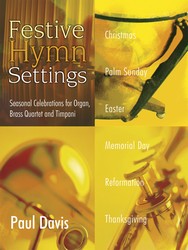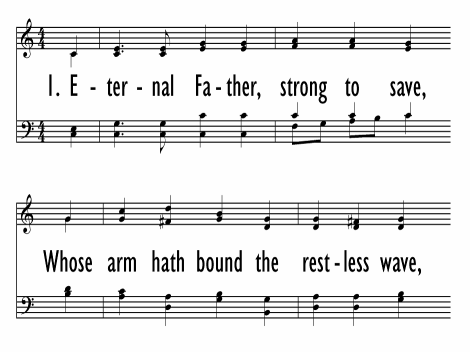- |
User Links
Eternal Father! strong to save

Eternal Father, strong to save, Whose arm hath bound the restless wave
Author: William Whiting (1860)Tune: MELITA (Dykes)
Prayer Songs
Published in 430 hymnals
Printable scores: PDFPlayable presentation: Lyrics only, lyrics + musicAudio files: MIDI, Recording
Representative Text
1 Eternal Father, strong to save,
Whose arm does bind the restless wave,
Who bids the mighty ocean deep
Its own appointed limits keep;
O hear us when we cry to Thee
For those in peril on the sea.
2 O Savior, whose almighty word
The winds and waves submissive heard,
Who walked upon the foaming deep,
And calm amid the rage did sleep;
O hear us when we cry to Thee
For those in peril on the sea.
3 O Holy Spirit, who did brood
Upon the waters dark and rude,
And bid their angry tumult cease,
And give for wild confusion peace;
O hear us when we cry to Thee
For those in peril on the sea.
4 O Trinity of love and pow'r,
Your children shield in danger's hour;
From rock and tempest, fire, and foe,
Protect them where-so-e'er they go;
Thus, evermore shall rise to Thee
Glad hymns of praise from land and sea.
Baptist Hymnal, 1991
Author: William Whiting
 William Whiting was born in Kensington, November 1, 1825, and was educated at Clapham and Winchester Colleges. He was later master of Winchester College Choristers' School, where he wrote Rural Thoughts and Other Poems, 1851. He died at Winchester.
--The Hymnal 1940 Companion… Go to person page >
William Whiting was born in Kensington, November 1, 1825, and was educated at Clapham and Winchester Colleges. He was later master of Winchester College Choristers' School, where he wrote Rural Thoughts and Other Poems, 1851. He died at Winchester.
--The Hymnal 1940 Companion… Go to person page >Text Information
Related Texts
| First Line: | Eternal Father, strong to save, Whose arm hath bound the restless wave |
| Title: | Eternal Father! strong to save |
| Author: | William Whiting (1860) |
| Meter: | 8.8.8.8.8.8 |
| Language: | English |
| Refrain First Line: | O hear us when we cry to Thee |
| Notes: | Spanish translation: See "Eterno y poderoso Dios" by Anonymous |
| Copyright: | Public Domain |
| Liturgical Use: | Prayer Songs |
- (hymns)
- (hymns)
- (hymns)
- (hymns)
- (hymns)
- (hymns)
- (hymns)
- (hymns)
- (hymns)
- (hymns)
- (hymns)
- (hymns)
- (hymns)
- (hymns)
- (hymns)
- (hymns)
- (hymns)
- (hymns)
- (hymns)
- (hymns)
- (hymns)
- (hymns)
- (hymns)
- (hymns)
- (hymns)
- (hymns)
- (hymns)
- (hymns)
- (hymns)
- (hymns)
- (hymns)
- (hymns)
- (hymns)
- (hymns)
- (hymns)
- (hymns)
- (hymns)
- (hymns)
- (hymns)
- (hymns)
- Year A, Holy Week season, Tuesday of Holy Week
- Year A, Ordinary Time, Proper 14 (19)
This is recommended for Year A, Ordinary Time, Proper 14 (19) by 2 hymnal lectionary indexes including Glory to God: the Presbyterian Hymnal #8. - Year A, Ordinary Time, Proper 26 (31)
- Year B, Ordinary Time, Proper 6 (11)
- Year B, Ordinary Time, Proper 7 (12)
This is recommended for Year B, Ordinary Time, Proper 7 (12) by 2 hymnal lectionary indexes including Glory to God: the Presbyterian Hymnal #8. - Year B, Ordinary Time, Proper 12 (17)
This is recommended for Year B, Ordinary Time, Proper 12 (17) by 2 hymnal lectionary indexes including Glory to God: the Presbyterian Hymnal #8. - Year B, Ordinary Time, Proper 24 (29)
This is recommended for Year B, Ordinary Time, Proper 24 (29) by 2 hymnal lectionary indexes including Glory to God: the Presbyterian Hymnal #8.
Notes
Eternal Father, strong to save. W. Whiting. [For those at Sea.] Of this hymn the following texts are known :—
1. The original manuscript, 1860, a reprint of which is preserved in Biggs's Annotated Hymns Ancient & Modern, 1867, pp.270-271.
2. The revised text by the Compilers of Hymns Ancient & Modern, 1861, No. 222. This is most widely used of any.
3. A revision by the author made for the Appendix to the Society for Promoting Christian Knowledge Psalms and Hymns, 1869, and repeated in Church Hymns, 1871, No. 321.
4. A Latin version also by Whiting, in Biggs's Annotated Hymns Ancient & Modern, 1867, pp. 270-71. This version is of the Hymns Ancient & Modern, revised text of 1861, and not of the original manuscript.
The lack of hymns for those at sea, together with its merits as a hymn, rendered it exceedingly popular from its first publication, and its use has become most extensive in English-speaking countries. Hodges, of Frome, has published a short tale founded thereupon, and entitled "Hymn 222." Original text as above, authorized text, Church Hymns, No. 321.
--John Julian, Dictionary of Hymnology (1907)
A large number of additional stanzas have been written over the century and a half since Whiting's text first appeared. Those most frequently found in hymnals are substitutionary second (land) and third (air) stanzas intended to make what is customarily thought of as the "Navy Hymn", and what was originally a hymn for travel mercies on the ocean-going, applicable to travelers by land and air as well; these stanzas were written by Robert Nelson Spencer, and first published in 1937. When the Spencer stanzas are included, the first line and title are frequently altered to "Almighty Father..." and the last line of the fourth stanza to "Glad praise from air and land and sea" (as for example in Hymnal 1940 #513, where Spencer is uncredited). (comment by Haruo)
A webpage of the United States Navy gives the following additional stanzas (and ascriptions):
Lord, guard and guide the men who fly
Through the great spaces in the sky.
Be with them always in the air,
In darkening storms or sunlight fair;
Oh, hear us when we lift our prayer,
For those in peril in the air!
Oh, Watchful Father who dost keep
Eternal vigil while we sleep
Guide those who navigate on high
Who through grave unknown perils fly,
Receive our oft-repeated prayer
For those in peril in the air.
Eternal Father, grant, we pray,
To all Marines, both night and day,
The courage, honor, strength, and skill
Their land to serve, thy law fulfill;
Be thou the shield forevermore
From every peril to the Corps.
Lord, stand beside the men who build,
And give them courage, strength, and skill.
O grant them peace of heart and mind,
And comfort loved ones left behind.
Lord, hear our prayers for all Seabees,
Where'er they be on land or sea.
Lord God, our power evermore,
Whose arm doth reach the ocean floor,
Dive with our men beneath the sea;
Traverse the depths protectively.
O hear us when we pray, and keep
Them safe from peril in the deep.
O God, protect the women who,
In service, faith in thee renew;
O guide devoted hands of skill
And bless their work within thy will;
Inspire their lives that they may be
Examples fair on land and sea.
adapted by James D. Shannon (1973)
Lines 5-6, Beatrice M. Truitt (1948)
Creator, Father, who dost show
Thy splendor in the ice and snow,
Bless those who toil in summer light
And through the cold antarctic night,
As they thy frozen wonders learn;
Bless those who wait for their return.
Eternal Father, Lord of hosts,
Watch o'er the men who guard our coasts.
Protect them from the raging seas
And give them light and life and peace.
Grant them from thy great throne above
The shield and shelter of thy love.
Eternal Father, King of birth,
Who didst create the heaven and earth,
And bid the planets and the sun
Their own appointed orbits run;
O hear us when we seek thy grace
For those who soar through outer space.
Creator, Father, who first breathed
In us the life that we received,
By power of thy breath restore
The ill, and men with wounds of war.
Bless those who give their healing care,
That life and laughter all may share.
Adapted by James D. Shannon (1970)
God, Who dost still the restless foam,
Protect the ones we love at home.
Provide that they should always be
By thine own grace both safe and free.
O Father, hear us when we pray
For those we love so far away.
Lord, guard and guide the men who fly
And those who on the ocean ply;
Be with our troops upon the land,
And all who for their country stand:
Be with these guardians day and night
And may their trust be in thy might.
O Father, King of earth and sea,
We dedicate this ship to thee.
In faith we send her on her way;
In faith to thee we humbly pray:
O hear from heaven our sailor's cry
And watch and guard her from on high!
And when at length her course is run,
Her work for home and country done,
Of all the souls that in her sailed
Let not one life in thee have failed;
But hear from heaven our sailor's cry,
And grant eternal life on high!
Tune
MELITA (Dykes)The original chant melody associated with this text [i.e., "Eternal Father, strong to save"] is found in most hymnals of denominations where chant has played a role, including the Lutheran tradition, which has produced much organ music on this well-known chant. The setting here is by John B. Dykes (…
For Leaders
Text:
William Whiting wrote this hymn in 1860 in England. It was modified in 1861 by the editors of Hymns Ancient and Modern, where it was first published. Whiting also revised it a few times. It has become a favorite of seafaring people in English-speaking countries, both civilian and military. In America, its affiliation as the “Navy Hymn” is prompted in part by the practice dating from 1879 of concluding the Sunday services at the Naval Academy at Annapolis with the first stanza of this hymn. The first three stanzas of this hymn appeal to the Trinity with Scripture passages where each Person controlled the sea, while the final stanza summarizes the hymn and promises continued praise “from land and sea.”
Tune:
MELITA is named after the island where Paul was shipwrecked (Acts 28:1 KJV; modern Bible translations have “Malta”). It is a fitting name for a tune associated with a text about safety on the seas. MELITA was composed by John B. Dykes especially for this text in 1861, and they were published together in Hymns Ancient and Modern.
This tune is well-known and should pose little problem for congregational singing. However, the rhythm is consistently steady, with no obvious places for breathing, so worship leaders should choose a moderate tempo and indicate the ends of phrases. There is quite a bit of chromaticism throughout, which adds intensity to the mood.
When/Why/How:
Because of this hymn's association with the navy, it is used for services connected to the armed forces, such as Memorial Day. It is also used for sailors' funerals. Although this familiar tune is not hard to sing, congregation members may be more familiar with hearing instrumental versions, such as are found in “All Nature Sings” for piano with the melody in varying registers, or “Eternal Father, Strong to Save” a piano and organ duet that begins in a quiet, prayerful mood but swells to a majestic climax.
Tiffany Shomsky, Hymnary.org
Timeline
Arrangements
Media
- MIDI file from Baptist Hymnal 1991 #69
- Audio recording from Baptist Hymnal 1991 #69
- MIDI file from Baptist Hymnal 1991 #69
- Audio recording from Baptist Hymnal 2008 #643
- MIDI file from The Cyber Hymnal #1363
- Audio recording from Evangelical Lutheran Worship #756
- Audio recording from The Faith We Sing #2191
- Audio recording from Glory to God: the Presbyterian Hymnal #8
- Audio recording from Trinity Hymnal (Rev. ed.) #630
- MIDI file from Worship and Rejoice #74


 My Starred Hymns
My Starred Hymns







